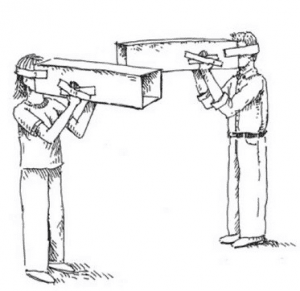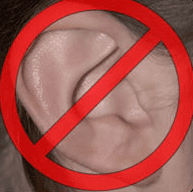 Welcome to Part 5 of my discussion on stress. In the last segment I talked about the positive and negative impacts of hyper vigilance and its impact on situational awareness.
Welcome to Part 5 of my discussion on stress. In the last segment I talked about the positive and negative impacts of hyper vigilance and its impact on situational awareness.
While stress-released hormones increase arousal of the senses, the brain struggles to process all the information coming in. If you try to process the meaning of all the audible and visual inputs, you may find yourself on the fast-track overload.
In this segment, I’m going to discuss tunnel vision. When I was a new recruit, I vividly remember my training officer telling us ‘don’t get tunnel vision.’ He said it with such conviction that I knew it was important. So I wrote it down. But he never really told us what it was, how we get it and most importantly, how to avoid it. Let’s explore the concept of tunnel vision.
Tunneled vision
 Early on in my journey into neuroscience I learned something about tunneled vision. It is a mislabeled term. While I have often heard the term used throughout my tenure in public safety – and having used it many times in my early years as an instructor, I never realized that the term tunnel vision does not accurately reflect what happens under stress. It’s a little more complex than I had realized.
Early on in my journey into neuroscience I learned something about tunneled vision. It is a mislabeled term. While I have often heard the term used throughout my tenure in public safety – and having used it many times in my early years as an instructor, I never realized that the term tunnel vision does not accurately reflect what happens under stress. It’s a little more complex than I had realized.
Tunneled senses
Tunneled senses more accurately depicts the results of stress. All your senses can become tunneled when you are stressed. For vision, it means your visual attention can be focused on one small geographic area of an emergency scene or one task being performed at a scene and you miss seeing things in your periphery. For hearing, it means your audible  attention can be focused on one source of sound, like a person talking to you face-to-face or text messages on your phone, or a siren of an approaching engine.
attention can be focused on one source of sound, like a person talking to you face-to-face or text messages on your phone, or a siren of an approaching engine.
When you are suffering from tunneled senses your situational awareness is vulnerable because you are likely to miss important clues and cues. Many things happen in the peripheral vision that will be lost when vision is tunneled. When hearing is tunneled, you can miss hearing other things happening around you. The fixation on a single conversation or a single sound prevents you from hearing other things.
It gets worse
 Researchers at Johns Hopkins University ran a series of audible and visual tests on human subjects, measuring the loss of acuity while engaging them in activities designed to narrow attention. The results were a shocker.
Researchers at Johns Hopkins University ran a series of audible and visual tests on human subjects, measuring the loss of acuity while engaging them in activities designed to narrow attention. The results were a shocker.
The experiment was designed to tunnel vision – and it did. But a completely unexpected event occurred. While the vision was being tunneled, the performance of the audible control center decreased. That was not a typo. Tunneled vision led to diminished hearing. Turns out, focusing on something intently led the audio cortex to turn down the volume.
When the researchers performed an experiment to tunnel the hearing, the performance of the visual control center decreased. Again, no typo. Tunneled hearing led to diminished vision.
This led the researchers to conclude that a person intently listening to audible cues, like a radio or cell phone, could have diminished visual performance. It also led the researchers to conclude a person intently focused on something visual could have diminished hearing.
Auditory exclusion
In some cases, when the stress is severe enough, the hearing receptors in the brain may shut off completely. Neuroscience has a term for that. It’s called auditory exclusion. Police officers often report that under stress of a gun fight they are unable to recall how many shots were fired because they did not hear them.
One of my teaching associates, is a firefighter, EMT and former police officer. He shares a story during my classes that drives this point home. One night, while sitting in his police car, he was ambushed by a deranged man with a shotgun. He man shot his police car multiple times, though he, himself, only remembers hearing one shot. The forensics evidence revealed the assailant had shot his car six times. My associate suffered from auditory exclusion, not to mention a whole host of other stress reactions he describes in vivid detail.
Dr. Gasaway’s Advice
 The first step in dealing with narrowing attention is to be aware that you are vulnerable to it happening as your stress level rises. Controlling your stress is one of the best ways to impact all of the ill-effects of the hormonal chemical dump that changes your psychological, cognitive, and physical performance. Breathing techniques are very effective for calming that little pea-sized organ in the brain that is the epicenter of your stress response. Control the pea and control the stress.
The first step in dealing with narrowing attention is to be aware that you are vulnerable to it happening as your stress level rises. Controlling your stress is one of the best ways to impact all of the ill-effects of the hormonal chemical dump that changes your psychological, cognitive, and physical performance. Breathing techniques are very effective for calming that little pea-sized organ in the brain that is the epicenter of your stress response. Control the pea and control the stress.
Scanning your environment may also help combat the effects of tunneled senses. Scanning visually and scanning audibly. If you find yourself becoming fixed on one task or one sound, make a conscious effort to unlock your senses from it and force yourself to scan your environment, perhaps asking yourself quizzically: What am I missing?
 Discussion Questions
Discussion Questions
1. Is it possible that auditory exclusion could cause critical radio traffic, like a mayday, to be missed?
2. Discuss a time when you missed seeing or hearing something because of tunneled senses.
3. Were you ever taught about auditory exclusion during your emergency training?
About the Author
Richard B. Gasaway, PhD, CSP is widely considered a trusted authority on human factors, situational awareness and the high-risk decision making processes used in high-stress, high consequence work environments. He served 33 years on the front lines as a firefighter, EMT-Paramedic, company officer, training officer, fire chief and emergency incident commander. His doctoral research included the study of cognitive neuroscience to understand how human factors flaw situational awareness and impact high-risk decision making.
_____________________________________________________

If you are interested in taking your understanding of situational awareness and high-risk decision making to a higher level, check out the Situational Awareness Matters Online Academy.
CLICK HERE for details, enrollment options and pricing.
__________________________________
Share your comments on this article in the “Leave a Reply” box below. If you want to send me incident pictures, videos or have an idea you’d like me to research and write about, contact me. I really enjoy getting feedback and supportive messages from fellow first responders. It gives me the energy to work harder for you.
Let’s Get connected
Facebook: SAMatters
LinkedIn: Rich Gasaway
LinkedIn: Situational Awareness Matters
Twitter: Rich Gasaway
Youtube: SAMattersTV
itunes: SAMatters Radio
Stitcher Radio: SAMatters Radio
Google Play: SAMatters Radio
iHeart Radio: SAMatters Radio

Pingback: Stress: The Nemesis of Situational Awareness | Situational Awareness Matters!™
I suffer from this, my symptoms are similar to central auditory processing disorder, I can hear but can’t comprehend the sentences. I can think but can’t string a sequence of words together to make a sentence, I can see a word and spell it out but can’t say it.
The symptoms last minutes, and are triggered by phone calls or me concentrating on a thinking task for an extended time. I’ve had these symptoms for over 13 years now, and have suffered 3 Epileptic fits over the last 2 years, triggered by me feeling very relaxed at the time.
My neurologist is only interested in my epilepsy.
I’m a software business analyst so my job involves using a computer and thinking and writing most of the time. I also run workshops with customers, and when that happens I don’t usualy have any symptoms
Kerry
York England
Kerry,
Thank you for sharing your story. If the condition impacts your quality of life and your neurologist is not interested in helping you with solutions, I would recommend seeing the help of another neurologist or a specialist in your disorder.
Rich
Thank you for sharing your feedback. I am pleased to know the article was helpful to you. Rich
Several years ago, I was on the scene of a motorcycle accident. It was on a rural road in Belgium. The person had a head-on collision with an SUV. The person in the SUV had gone to get help. I was totally alone with this woman. She was conscious when I arrived. Time slowed to a crawl. Although we were in rural farmland, my vision became totally tunneled and it was just silent out there. I remember it seemed to go from daylight to darkness. There were cows looking at us. It was the most confronting experience. I held her hand as we waited forever for emergency services to arrive. I experienced almost total silence. She passed as we waited for the ambulance. Your article perfectly describes how I seemed to lose all my senses out there. Once the ambulance arrived things went back to normal.
Ann,
I believe you assisted her as she passed in the most heartful, merciful, graceful way. Divine.
God bless you, Linda
Helpful
Article. I read this as I often find myself with cognitive tunnel vision when in a meeting. I stress out when having to defend my engineering research or am trying to make a point that others can not grasp. This place is usually when meeting with the group. The result is so severe that I cannot even operate my computer while exchanging ideas. This has setback my career a lot and I am determined to find solutions as I see similar response in my daughter. Any recommendations are appreciated.
Pingback: Tunnel Vision -
Pingback: How To Instantly Stop Negative Thoughts And Grow A More Positive Mindset Podcast - Excel
Pingback: Stress management: How journaling can help you regain control - Trubble
Pingback: How Courageous Employees And Leaders Can Put Anxiety To Good Use - WorldNewsEra
Pingback: How Courageous Employees And Leaders Can Put Anxiety To Good Use - Business Mayor
Pingback: Hur modiga medarbetare och ledare kan använda ångest - Posts Guide
Pingback: How Courageous Employees And Leaders Can Put Anxiety To Good Use - Forbes - The Anxiety Dork